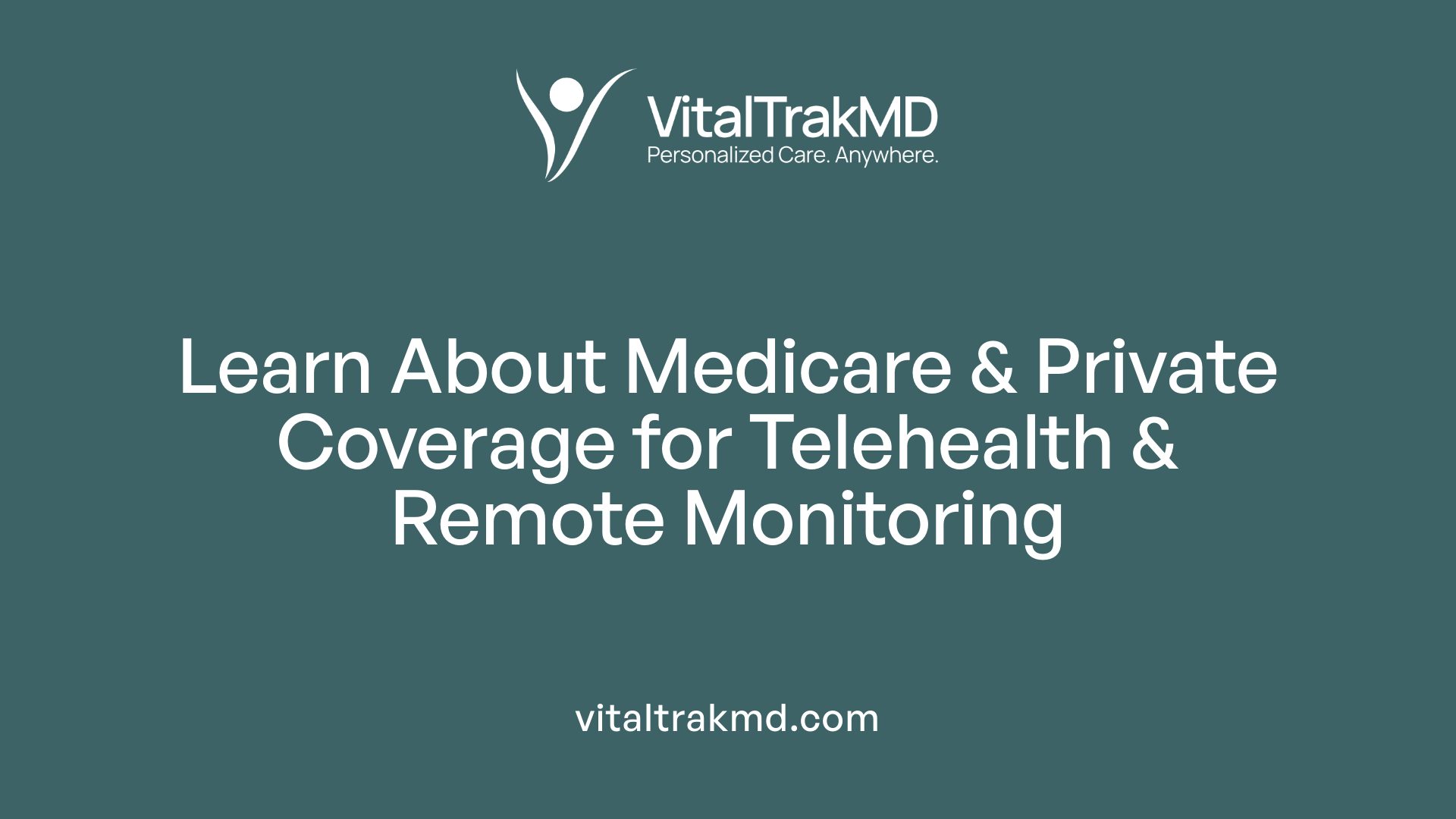Is Hybrid Healthcare Covered by Medicare or Private Insurance?

Understanding Hybrid Healthcare and Its Coverage Options
The healthcare landscape is evolving with the advent of hybrid healthcare models, which blend traditional in-person care with telehealth and digital health technologies. This comprehensive approach aims to improve access, convenience, and patient engagement. As these models grow in popularity, it is crucial to understand their coverage under major insurance plans like Medicare and private insurance. This article explores whether hybrid healthcare services are covered, how coverage varies, and what options are available for beneficiaries.
What Constitutes Hybrid Healthcare?
What is hybrid healthcare?
Hybrid healthcare is an innovative model that combines traditional in-person medical services with telehealth and digital health technologies. This approach offers patients multiple ways to access healthcare, such as visiting a clinic or consulting with providers remotely using video calls or online platforms.
By integrating these different modalities, hybrid healthcare aims to make care more accessible, convenient, and tailored to individual needs. Patients can receive routine check-ups, follow-up consultations, or health education from their homes while still having the option for face-to-face visits when necessary.
This model enables healthcare providers to deliver personalized treatments, monitor health status remotely through digital tools, and communicate more efficiently with patients. It supports a proactive approach to health management by leveraging technology to improve engagement and adherence to treatment plans.
Overall, hybrid healthcare creates a flexible and effective system that adapts to the evolving landscape of medical care and technological advancements, enhancing both patient experience and clinical outcomes.
Coverage of Home Health Services by Medicare
Are home health care services covered under Medicare?
Medicare provides coverage for certain home health services when specific criteria are satisfied. Both Medicare Part A (Hospital Insurance) and Part B (Medical Insurance) play roles in funding these services.
To qualify, patients must be considered 'homebound,' meaning they have severe difficulty leaving their residence without assistance. Additionally, the care must be part-time or intermittent and ordered by a healthcare provider who evaluates the patient face-to-face. The services must come from a Medicare-certified home health agency.
Medicare covers a wide range of home health care services, including skilled nursing, physical, occupational, speech therapies, and care provided by a home health aide. Crucially, these services are only covered if they are deemed medically necessary.
Most beneficiaries incur no out-of-pocket costs for these covered services. However, they may need to pay for durable medical equipment and the Part B deductible. It's important to note that Medicare generally does not pay for 24-hour home care or services unrelated to medical needs such as home meal delivery or personal homemaker services unless combined with skilled care.
In summary, as long as patients meet the eligibility requirements and receive services through an approved agency, Medicare helps cover essential home health care, easing the burden of medical expenses for many seniors and disabled individuals.
| Coverage Area | Included Services | Eligibility Notes | Cost Sharing |
|---|---|---|---|
| Medicare Part A & B | Skilled nursing, therapies, aide care, wound care, injections, medical social services | Homebound, face-to-face assessment, Medicare-certified agency | Usually free, but deductible and 20% coinsurance apply |
This coverage ensures that beneficiaries can access necessary health care at home without the stress of exorbitant costs, provided they meet the outlined criteria.
How Medicare Coordinates Benefits with Private Insurance

How does Medicare coordinate coverage with private insurance if I have both?
When a person holds both Medicare and private insurance, understanding how benefits are coordinated is crucial. This process, called 'coordination of benefits,' determines which insurance pays first and how remaining costs are handled.
Typically, if you are covered by a group health plan through an employer with more than 20 employees, your private insurance is usually the primary payer. Medicare then acts as the secondary payer, covering costs that the primary insurance does not fully pay.
Conversely, if your employer has fewer than 20 employees, Medicare may serve as the primary payer, with the private plan paying second. This hierarchy ensures that payments are well managed and prevents duplicate or excessive reimbursements.
The process involves several steps. The insurance companies work together through systems managed by Medicare's Benefits Coordination & Recovery Center (BCRC) and Medicare Administrative Contractors (MACs). They share information to identify which plan pays first and for what services.
Once the primary insurer processes the claim and makes its payment, the secondary payer—Medicare or your other plan—reviews what's left to be covered. They may pay some or all of the remaining costs, such as coinsurance, copayments, or deductibles.
For prescription drugs and other personalized benefits, your plans coordinate as well. If you have Medicare Part D (prescription drug coverage) and a Medicare Advantage plan, the plans work together to determine payment order and avoid duplication.
This coordination process also includes protecting beneficiaries from overpayments. If the secondary payer overpays or the primary insurer does not pay as expected, Medicare may make a conditional payment and later recover the costs.
Knowing which plan pays first helps you manage your healthcare costs better and understand your financial responsibilities. If you're unsure about your coverage or notice discrepancies, you can contact your insurance providers or consult Medicare resources.
How does Medicare coordinate coverage with private insurance if I have both?
| Situation | Primary Payer | Secondary Payer | Additional Notes |
|---|---|---|---|
| Employer with >20 employees | Private insurance (employer plan) | Medicare | Medicare covers remaining costs; benefits depend on specific plans. |
| Employer with <20 employees | Medicare | Private insurance | Medicare pays first; private plans pay second for covered services. |
| Medicare and Medicaid (Dual Eligible) | Medicaid (if payer of last resort) | Medicare | Duals may have plans like Dual Special Needs Plans (D-SNP) that optimize coordination. |
| Medicare and Medicare Advantage (Part C) | Medicare Advantage Plan | Medicare (if needed) | Many Advantage plans include prescription drugs and extra benefits, working closely with Medicare. |
Understanding these dynamics helps ensure you get the coverage you need without unexpected costs. It's advisable to review your plans annually and ask your providers about how benefits are coordinated.
Coverage Options in Hybrid Healthcare Plans

What should I know about coverage options for hybrid healthcare plans?
Hybrid healthcare plans typically combine different types of coverage to meet both health and financial needs. These plans often include a blend of long-term care benefits, such as nursing home, assisted living, and in-home care, along with life insurance or annuity features.
The specific services covered depend on the policy. Many hybrid plans provide benefits like coverage for extended skilled care, home health services, or medical support, often with predetermined benefit amounts, durations, and waiting periods.
One notable feature of hybrid plans is their guarantee of certain benefits, such as a death benefit or cash value, which can serve as financial security or savings. Some plans also offer inflation protection, allowing benefits to increase over time, and flexible payment options for premiums.
However, the cost of these plans can be significant, and coverage details vary widely. These include important factors like benefit caps—limits on the amount paid out—and how payouts are structured. Some plans may reduce the death benefit once certain healthcare benefits are utilized.
When choosing a hybrid healthcare plan, it’s crucial to carefully compare the available options. Consulting with an insurance or financial specialist can help ensure the selected plan aligns with your healthcare needs and long-term financial goals.
In summary, hybrid healthcare plans offer a versatile approach but require careful consideration of their benefit caps, payout options, and overall costs to make an informed decision.
What Is a Hybrid Health Insurance Plan?
 A hybrid health insurance plan combines features from different types of healthcare coverage to create a personalized plan suited to individual needs. These plans blend elements such as deductibles, copays, and coverage options from traditional, high-deductible, or specialized plans, offering more flexibility.
A hybrid health insurance plan combines features from different types of healthcare coverage to create a personalized plan suited to individual needs. These plans blend elements such as deductibles, copays, and coverage options from traditional, high-deductible, or specialized plans, offering more flexibility.
Such plans often include a mixture of benefits like preventive services, dental, vision, and even telehealth options, making them versatile choices for consumers seeking comprehensive coverage. Providers like Excellus BCBS and others may offer hybrid plans that involve elements from Medicaid, Medicare, or the marketplace, often with added perks like prescription drug coverage.
The main goal of a hybrid plan is to balance cost-efficiency with extensive coverage, allowing consumers to customize their healthcare experience. For example, a plan could combine the affordability of a high-deductible plan with enhanced preventive and wellness benefits, or integrate additional services such as routine dental or vision care, which are not always included in traditional Medicare.
These plans are ideal for those who want the flexibility to select a combination of coverage types and benefits that align with their health needs and financial situations. Overall, hybrid health insurance plans aim to offer a more tailored and comprehensive approach to healthcare, catering to diverse preferences and requirements.
Telehealth and Remote Monitoring Coverage under Medicare and Private Insurance

Is telehealth and remote monitoring service included in Medicare coverage?
Yes, Medicare provides coverage for a range of telehealth and remote patient monitoring services targeted at eligible beneficiaries. Under Medicare Part B, beneficiaries can access telehealth consultations, including doctor visits, outpatient care, and preventive services, all delivered remotely via audio and video technology. In some cases, audio-only services are also covered, especially for individuals with limited access to video technology. Payments for telehealth services are generally similar to those for in-person visits.
Telehealth coverage has seen significant expansion during the COVID-19 pandemic, and many of these flexibilities are being extended through September 2025. Beneficiaries can now access these services from virtually any location in the United States, including their homes, although some restrictions apply starting October 1, 2025.
Beyond real-time consultations, Medicare also reimburses for remote patient monitoring (RPM). RPM involves the use of FDA-approved connected medical devices that patients can use to track health metrics like blood pressure, blood sugar, and heart rate. Healthcare providers collect this data remotely, enabling better management of chronic or acute health conditions without frequent in-person visits.
Additional coverage enhancements are offered by Medicare Advantage plans, which may include extra benefits such as expanded telehealth options, higher coverage for behavioral health, and technology support. These benefits support a more flexible, accessible healthcare experience, especially for those with mobility issues or residing in rural areas.
Overall, Medicare’s expanded telehealth and remote monitoring benefits aim to improve healthcare access and quality while reducing unnecessary hospital visits and promoting proactive health management.
| Coverage Type | Service Details | Provider Requirements |
|---|---|---|
| Telehealth | Video or audio healthcare visits, mental health, preventive services | Delivered via approved telehealth platforms, with some restrictions post-2025 |
| Remote Patient Monitoring | Data collection from FDA-approved devices, chronic condition management | Devices must be FDA-approved; data reviewed by healthcare provider |
| Benefits through Medicare Advantage | Additional telehealth services, mental health, tech support | May include extra benefits not available under original Medicare |
Beneficiaries are encouraged to speak with their providers or insurance representatives to understand specific telehealth options available to them and any associated costs.
Duration of Medicare Coverage for Home Health Care

How long will Medicare pay for home health care?
Medicare generally provides coverage for home health care services as long as the patient stays eligible, is considered 'homebound', and needs skilled services. The process begins with an initial coverage period that typically lasts for 60 days.
Every 60 days, the patient's need for continued care must be recertified by a physician. This recertification ensures that the medical necessity for home health services persists. If the criteria are still met, Medicare can extend coverage for additional periods.
There is no predetermined maximum duration for receiving home health care from Medicare. As long as the patient continues to meet the eligibility requirements and shows ongoing medical need, Medicare may keep covering these services.
The covered services usually include skilled nursing, physical therapy, occupational therapy, speech therapy, and assistance from a home health aide, provided by a Medicare-certified agency. Importantly, the care plan must be reviewed and updated regularly to qualify for ongoing benefits.
Overall, Medicare’s support for home health care is indefinite, based on continuous medical necessity and recertification, allowing beneficiaries to receive needed services over an extended period. This flexible approach ensures that patients can maintain appropriate care without a fixed time limit, provided they meet the federal criteria at each interval.
Key Takeaways and Future Outlook
As hybrid healthcare models continue to expand, understanding the nuances of coverage under Medicare and private insurance becomes essential. While Medicare broadly covers many services involved in hybrid models, especially home health and telehealth, coverage specifics depend on individual plan details and eligibility criteria. Private insurers also adopt various policies, often mirroring Medicare’s offerings but with additional benefits or restrictions. Ultimately, beneficiaries should review their specific plans, stay informed about policy changes, and consult healthcare providers to ensure optimal access to hybrid healthcare services. The future of healthcare coverage likely involves more integration of digital services, emphasizing the importance of understanding existing benefits and planning for emerging therapies and tools.
References
- Home Health Services Coverage - Medicare
- Best Medicare Choices Right Now - Consumer Reports
- United States | International Health Care System Profiles
- What older workers need to know about the hybrid health care world
- How Medicare works with other insurance
- Majority of Americans Favor Public-Private Hybrid Healthcare ...
- The differences between Medicare and Medicaid | News & articles
Recent articles
Want to Feel Better and Live Healthier?
Join hundreds of patients taking control of their health with personalized care that fits their life – not the other way around.
Rated 4.8/5 by 32+ customers







